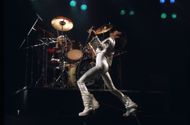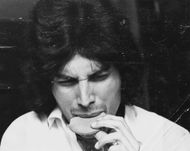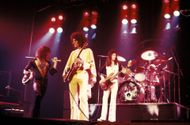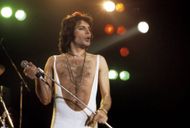Freddie Mercury, Queen's legendary lead singer, is not only remembered for having a beautiful singing voice but for his boundary-pushing performances that defied rock music rules. His 1985 Live Aid performance ranks as one of the greatest live performances in music history and cemented his place as one of the most sophisticated and commanding performers of his time.
Freddie Mercury's authoritative on-stage presence and power to mobilize an audience on a deep level made each show an event, guaranteeing his place in the annals of rock history. His unique voice and inexhaustible energy have touched the lives of generations of musicians, and his impact on music has been deeply lasting, and will continue to echo through future generations, reminding the listener as well as the performers of the enormity of unbridled talent.
Freddie Mercury was more than a singer, he was a tireless force of nature who remapped the sound and feel of rock music. With his blinding charisma and staggering vocal range, he did not just sing; more than that, he performed with opera-like drama that transformed concerts into one-time spectacles.
As lead vocalist of Queen and brazen solo artist, Freddie Mercury applied an uncompromising level of artistry to each note, blending emotion and excess in his work. His music, from bombastic operatic numbers to stormy rock anthems, is an unbridled imagination that cannot be bound.
Forty years on, his voice and vision still ruffle feathers in music and society. But from such a dazzling body of work, which of his songs truly reflect his legacy?
Disclaimer: This article contains the writer's opinion. The reader's discretion is advised!
Here are the top 10 Freddie Mercury songs that still set the stage on fire
Even years after his death, Freddie Mercury's songs still ignite stages and playlists with the same unrivaled fervor. His songs are not nostalgic throwbacks to a bygone time, they're breathing performances that keep drawing in with unspoiled energy and operatic majesty.
Whether it's the operatic grandeur of Bohemian Rhapsody or the stomp-strut swagger of We Will Rock You, Freddie Mercury's vocals still call with the same ferocity now as when he initially stunned fans.
His brilliance at genres, moods, and personas is the reason his music remains timeless. These ten tunes are not simply fan favorites, these are scorching, glowing embers that remind us Freddie never actually left the stage.
1) I Want to Break Free
I Want to Break Free, from Queen's 1984 The Works album, is one of Queen's anthems, not only due to its choruses, but due to its message of individual freedom and desire to revolt against convention. Underneath its trashy synth-pop veneer lies a serious man's plea for freedom and desire to escape convention.
Freddie Mercury's vocals add drama and power to the song, making a line that sounds platitudinous one of freedom. Its legendary video, in which the members of the group are shown in drag, added yet another layer of transgression and stoked controversy regarding identity and expression.
Through the years, as it has stood since its time of release, the song has accumulated increasingly more symbolism, having been called upon by movements and persons as a symbol of empowerment.
Now, even in today's times, the song remains speaking to us in a powerful voice, reminding us that the desire to flee, either from responsibility, attachments, or shackles, is human to us.
Read More: Top 10 Whitney Houston songs that will always live on
2) Bohemian Rhapsody
Released on Queen's A Night at the Opera release in 1975, Bohemian Rhapsody was a performance that overstepped the limits of rock music. Rather than adhering to the radio-friendly verses, Freddie Mercury wrote a song of music that unfolded as a drama, uninterruptedly floating from moody piano balladry, into operatic excess, and ending on frenzied hard rock.

Returning at close to six minutes and with no conventional chorus, its composition was ambitious and innovative but resonated with music fans around the world. Though questioned by the band's record label early on as to whether it would be chart material or not, the track proceeded to ascend charts and win fans over with its space lyrics, thick vocal timbres, and Brian May's distinctive guitar work.
Through the decades, it grew only more culturally popular, warranted again by following generations in forms such as film montages and cover bands. Bohemian Rhapsody did not simply succeed, it became an icon for rock's art of end purposes and Freddie Mercury's mastermind genius.
Read More: 8 most popular John Lennon songs of all time
3) We Will Rock You
Nearly 50 years ago, Queen and lead vocalist Freddie Mercury sang a song that became a stadium anthem throughout the world: We Will Rock You. Even though its stomp-clap beat is familiar in a split second, the story behind it in the lyrics often gets ignored. Freddie Mercury's biting, machine-speed rhymes explore the condition of man across three stages, youth, adulthood, and geriatric stages, and infuse layers where many find only a fight song.

Impressed by the sound and atmosphere of the venerable Boston Garden, Brian May composed the pounding rhythm of the song to simulate the ear-blinding din of a hyped-up crowd off the wooden rafters.
Years later, the song is still a rallying call for fans energizing their teams, usually preceded by We Are the Champions. The two anthems together symbolize the struggle and victory that make life and sport what they are.
Read More: Top 8 Sabrina Carpenter tracks you can’t miss
4) We Are The Champions
Queen's We Are the Champions, off their 1977 News of the World album, is a ballad of rock, but also a survival hymn to the human need for vindication following hardship. Written by Freddie Mercury, it is showmanship and pathos in one and an improved form than any typical victory anthem.

As much as it stands there basking in triumph, it demands credit for the labor that has created this, the bittersweet triumph of warriors who have fought their way up to the high places. The anthem-like words of Freddie Mercury and the emotive playing of guitar by Brian May give a drama that has been earned and not served on a plate.
The song has discovered a second lease of life recently, off the stage of the theater, as a war cry anthemic in stadiums and celebrations of victory wherever in the world. It lives not just on the credit of its melody but of its message: real champions are hardened in adversity, and that process must be spoken out.
Read More: 10 best Charli XCX songs that redefined pop
5) Somebody To Love
Freddie Mercury's Somebody to Love is stunning evidence of the singing ability and Queen's rock-steady musicianship. Released in 1976 on the album A Day at the Races, the song is among the band's most timelessly created works of music, an example of Freddie Mercury's extraordinary ability to blend technical mastery with intense emotional commitment. The song is an open plea for love and mercy, and the lyrics reflect a bare feeling of vulnerability and desire.
Freddie Mercury's version puts these words across as a hymn to appeal to the heart of each human being who has ever yearned to feel the human touch. Freddie Mercury, Brian May, and Roger Taylor harmonize with soul- and gospel-tinted sounding lines interlacing such harmonies that remind one of a rich-sounding chorus and making the emotional pull of the song even greater.
The gradual but persistent build-up, piano introspection to blinding, over-the-top climax, grips the struggle between isolation and tortured longing for love. The song combines Queen's distinctive style with typical human emotional depth, and it ranks among their most digestible songs. Somebody to Love is still a throwback song to remind everyone of humans' desire for love and compassion.
Read More: 10 Nirvana songs that changed rock forever
6) Under Pressure
In 1981, the song, Under Pressure, was a rock moment that will never be forgotten, a flash but inspired impromptu collaboration between Queen and David Bowie. It was made in one of those spontaneity-moment ad-hoc sessions in Switzerland, yet what resulted is a song greater than the event, one of the finest emotionally charged duets in music history.
Against the context of urgency and tension created by John Deacon's iconic bassline, Bowie and Freddie Mercury's vocals overlap with intensity, both expressing the intense stress of contemporary life as well as the intrinsic requirement for human sympathy and solidarity.

The piece becomes more emotional and resolves into an emotional climax before finally reaching a cathartic peak of energy, with Mercury's emotional vocals wailing despair as well as hope in equal measure.
Under Pressure is not merely a song; it's an exercise in vulnerability, a cultural commentary on the pressure that pervades society, and a metaphor for what occurs when two iconic artists take their raw emotions and bring them to a common creative space.
This happy convergence not only produced a classic but also showed the power of collaboration in music to transform and has left an indelible stamp on the cultural heritage of the '80s and onward.
Read More: 12 songs that capture Doechii’s genre-bending brilliance
7) Love of My Life
Queen's Love of My Life ballad off A Night at the Opera (1975) might be the group's most emotional, heartfelt ballad. It is a ballad by Freddie Mercury for his longtime love interest, Mary Austin. The song showcases a less flashy side to Freddie Mercury that will not be observed in much of the band's more bombastic material. The song has low-key minimalist music with harp and piano accompanying Freddie Mercury's vocals as a background.

The song was not a sudden hit but became popular later and had a huge fan base, especially in South America, where the fans used to hum the song along with it whenever Freddie Mercury sang the song during his concerts. This hum-along moment became a highlight of Queen’s live shows.
Love of My Life is a powerful statement of love and longing, a departure from Queen's typical bombast but emotionally compelling in a way that lasts. It's a powerful indication of Mercury's vulnerability, his ability to convey strong feelings sincerely and empathetically.
Read More: Top 10 Cardi B songs that defined her career
8) Radio Ga Ga
Radio Ga Ga, the first single from Queen's 1984 album The Works, is a keen observation on the past of media and consumer culture. Composed by drummer Roger Taylor, the song mingles the mechanical beat of synth-pop with Queen's bombast, a backward and forward-looking sound.
Instead of simply praising radio, the song bemoans its waning authority in a world of image-suffused media, and lost fantasy and closeness in the act of listening to music by enthusiasts.
Freddie Mercury's impassioned delivery adds vulnerability and yearning to the song, and it transcends commentary; it's a sincere paean to the good old days when radio was the umbilical that linked performers and listeners.
The sing-along nature of the song, that Radio Ga Ga chorus, was also used as a personal anthem in and of itself, particularly during Queen's now-infamous Live Aid show, when the group's clap-in generated a palpable sense of unity.
The song isn't actually even about the past, it's actually more of a reminder of the common call for emotional connection in a digitized universe.
Read More: The 10 greatest Pink Floyd songs of all time
9) The Show Must Go On
Tracking through Queen's 1991 album Innuendo, The Show Must Go On is a massive tribute to fortitude and artistic courage. A song credited principally to guitarist Brian May, though the recording became irrevocably inextricably tied up in Freddie Mercury's own history, the track was laid down in the final months of Freddie Mercury's life during his struggle with the rapid advancement caused by AIDS.

With his unstable health, Freddie Mercury nonetheless delivered a performance which was thunderous and unbending, punctuated by theatre force and great emotional will. Contrary to hinting at defeat, the song oozes defiance, encapsulating the mindset of an artist who refuses to be silenced by sickness.
The expansive arrangements highlight its appeal of pushing forward despite adversity, as Freddie Mercury pours the last of his strength into every soaring note. In the years since his death, the song has grown into something more than a record, it's an enduring icon of Freddie Mercury's life and unbreakable spirit of an artist who, to the last, continued to command the light.
Read More: 8 must-listen Elvis Presley songs of all time
10) Barcelona
Back in 1987, Barcelona splashed onto the globe as a daring mix of opera and rock, born out of Mercury's passion for the classics and his passion for soprano Montserrat Caballé. Rather than simply blurring lines, the song remakes what a musical collaboration really would be like, stretching two worlds that could otherwise be so very far away from each other in a sweeping spectacle.

Written as a paean to the bustling Spanish city, the song capitalized on lush orchestral charts and velvety vocals, Freddie Mercury and Caballé exchanging verses in an operatic epic of dominance and fervor. During the time such genre-leaping duos weren't the exception, Barcelona played hooky with the rules and proudly flaunted Freddie Mercury's unwaveringly unapologetic artistic sense.
Its operatic splendor and emotional weight went further than upon original release, especially when utilized as a de facto anthem in 1992 during the Barcelona Olympic Games. Eventually, Barcelona exceeds its status as a duet, it's a tribute to musical potential and a searing demonstration of Freddie's avant-garde continuum.
Read More: 10 Jay-Z songs that changed the rap game
Freddie Mercury's music is a forever classic vignette of his Himalayan talent, emotional depth, and imagination. Whether opera drama of Bohemian Rhapsody, anthem pomp of We Are the Champions, or tongue-in-cheek bravado of Don't Stop Me Now, Mercury possessed an unforgettable talent to convert emotion into music. Mercury's music moved effortlessly across genres, mixing rock, pop, opera, and theatre with laconic ease.
All of his recordings that he ever produced reflected his stamp: good vocals, war orchestration, and a distinct artistic vision. Not only singles, his recordings possessed the subtlety of human emotion, joys, sorrows, nonconformity, love, and yet continue to entertain the masses for decades.
Keep reading SoapCentral for more informative content!
Also Read: Top 10 50 Cent songs that define his legacy
